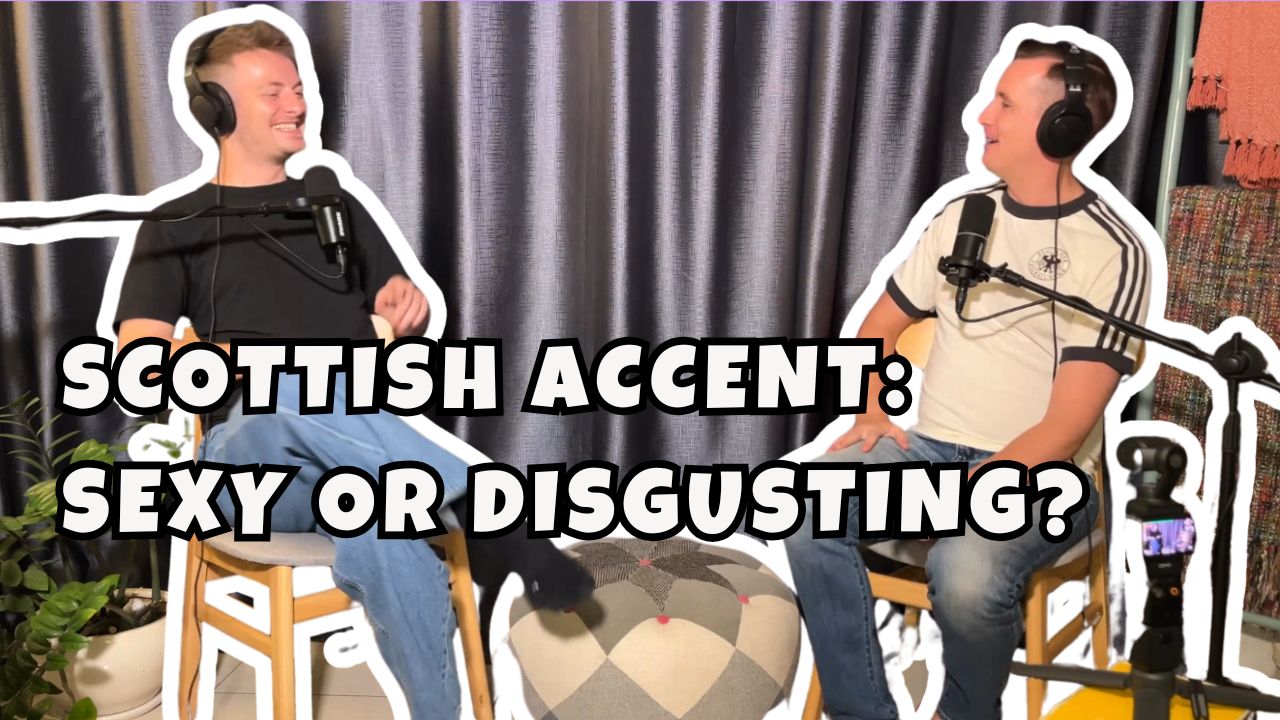
When I started this podcast, one of the things I wanted to do was have honest, funny, and real conversations with people who’ve had interesting journeys — especially those who, like me, somehow ended up in Vietnam and never left.
My name is Naill Mackay, founder of Seven Million Bikes Podcasts and the host of this show.
In this episode, I finally got to sit down with my good friend Craig Hagger. We’re both Scottish, both living in Saigon, and both full of stories from growing up in Glasgow to finding a new home halfway around the world.
Sharing Heritage
I wanted to begin with something we both had in common — we’re both Scottish. He went to Lenzie Academy, which is seen as a bit fancy. I went to Thomas Muir High School — just a regular high school.
Then I asked him what it was like for him growing up in Kirkintilloch. He said it was great. He had a close group of friends, and they had a lot of freedom. They’d go to the Campsie Fells, hang out at each other’s houses, and play outside. He even joked about sounding old because they did all this before everyone had phones and iPads.
Later, we remembered watching the Euros together at the Rabbit Hole — a local Irish sports bar in Saigon. Like many Scots, we talked about how we always believe maybe, just maybe, this time Scotland could go far in a tournament. We always have hope, even though our team’s track record is terrible. I shared my memory of the 1998 World Cup — so full of hope at the start, only to crash out after losing badly.
Why Don’t Scots Stick Together?
Something I’ve noticed over the years is that I don’t often hang out with other Scottish people. It’s not on purpose. It’s not that I don’t like them — I just don’t meet many I connect with. I’ve been living outside Scotland for over 20 years now. And I can honestly say I can count on one hand the number of Scottish people I’ve actually become friends with and hung out with. It’s not that I don’t like them, it’s just not something that happens very often.
Meanwhile, the Irish are everywhere. I’ve travelled a lot and always met groups of Irish people. They stick together, support each other, and always seem to know someone’s cousin. That’s why there are Irish bars all over the world — they create spaces to meet.
Craig said he gets excited when he meets another Scot. He wants to be friends straight away. But for me, it just hasn’t happened like that. Maybe it is me. Maybe I’m just a bit of a dick. I even joked that I left Scotland for a reason.
I think one big reason Scots don’t come together is football. In Glasgow especially, everything seems to come down to what school you went to and what team you support — Rangers or Celtic. It’s a huge divide. One time, a friend of Craig’s didn’t like me just because I was a Rangers fan. And I don’t even care that much! I used to go to games when I was younger, but now I just don’t care. I’ve met Rangers fans who try to talk to me like I’m really into it, and I just don’t relate.
Even here in Vietnam, a local taxi driver once asked Craig if he was “blue or green.” In Glasgow, that’s a loaded question — blue for Rangers, green for Celtic. You’d have to check where you were and who you were with before answering. It’s mad.
Changing My Accent and Talking About Identity
One thing I’ve definitely changed over the years is my accent. I used to speak in full-on fast Glaswegian, but now I’ve had to slow it down a lot. Americans and English people, especially always had trouble understanding me. The Vietnamese didn’t seem to mind too much, but it was mostly the Brits and Americans who’d be like, “What are you saying, mate?”
I started speaking more clearly, enunciating my words, and yeah — I think I sound a bit American sometimes. Craig said the same thing. We both kind of picked up bits of American English just from being abroad.
One time, I was home in Glasgow and saw one of my best mates. I slowed down the way I was speaking, and he said to me, “You don’t need to speak like I don’t speak English.”
Craig made a joke that if you can understand a Glasgow cabbie and you’re not from there, you should get an IELTS 9.0 — it’s like a test of ultimate English skill.
Our stories: How We Ended Up In Vietnam
Besides sharing the same roots of Scottish, we also chose the same place to settle – Vietnam.
After all that talk about growing up in Glasgow and all the chaos of school life, it felt like a good time to shift the chat. I asked Craig the simple question: “How did you end up in Vietnam?”
His story was like mine — and like most expats I know here. He came for six months, planning to travel around Southeast Asia, maybe visit Thailand, Cambodia, Laos… but never left. He finished his TEFL course, got a job teaching English, and it’s been seven years.
That’s the classic Saigon story. Nobody ever says, “I came for ten years.” We all came for a few months and somehow stayed forever.
Read My Story of Staying in Vietnam: Expat Life: How I ended up in Vietnam
First impression
Craig talked about those first moments in Vietnam — coming out of the airport, getting hit with a wall of heat, surrounded by crowds, motorbikes, chaos, and not knowing where to go. We both remembered how overwhelming Bùi Viện Street was the first time we walked down it. Sensory overload. But now, after years here, it almost feels like home.
He agreed 100% that Vietnam is addictive. Once you get used to the pace and learn how to get around, it feels good. You feel like an expert. He joked that his “Mastermind subject” would be “How to Cross the Road in Vietnam.”
Vietnamese Food – A reason to stay
He shared how food is a big part of Vietnamese culture and connection. He goes out with his boyfriend’s friends, joins family meals, and he’s not a picky eater, which helps. He even eats mắm tôm, a fermented shrimp paste that’s grayish-purple and smells strong. I’ve tried it. Once was enough. It’s… not for everyone.
I told Craig I once accidentally ate an intestine. I was at a school where students were doing a cooking competition. They offered me a dish to try. I took a bite and thought, “This feels like rubber.” Then I looked closer and realised what it was. I didn’t want to be rude, but I couldn’t finish it.
Still, even with the odd food experience, we both love it here. But Saigon can be a lot. It’s hot, loud, busy, polluted — and sometimes, you just need to get out. Craig and I both talked about needing little breaks, like trips to the beach or weekends in places like Mũi Né or Hội An. You leave, take a breath, and then when you come back, you’re like, “Yeah, I love this place.”
LGBT
I told Craig something I’ve shared on the podcast before — that I used to be homophobic. It’s not something I’m proud of. I didn’t come from a homophobic family, but I went to football games and was around that culture. My grandparents would say stuff sometimes, just casually. I remember they once called a gay TV presenter something awful.
It wasn’t until I moved to America and met a bisexual guy that I realised how wrong I was. He was just a normal guy — cool, funny, smart — and I was like, “What is wrong with me?” That moment changed everything for me, and I’ve never looked back.
Back in Glasgow, being gay wasn’t something people really talked about when I was in school. Nobody came out. Craig, who’s a bit younger than me, said he came out when he was 14, on MSN Messenger! He told his friend, and the next day, everyone at school knew. He just owned it and said, “Yes, I am.”
Craig said he was lucky overall. About 90% of people were supportive, though he did get bullied, but let’s be honest, everyone gets bullied in high school for something. He said being gay was just an easy target.
We laughed about the silly nicknames people used to get. I got called “Damien” because I apparently looked like the creepy kid from The Omen. Craig got called “Cocas” after asking a question in school about his college application. That name stuck for years.
I went to Thomas Muir High School, which was a good school, but not fancy. My parents moved us to a nicer suburb they could barely afford, hoping I’d get a better education. The area was next to some rougher neighbourhoods, so we had a mix of students — kids from nice homes and others who could be pretty wild. One guy once spat in my face just because I tackled him during football.
Craig said Lenzie Academy — his school — had a reputation for being posh, but bullying was still a big issue. It didn’t matter where you were from, bullying happened if you weren’t in the “right” group.
We talked about our friend Martin, who told us stories about his school in Torrance. The bullying there was even worse — physical stuff like smacking people with metal rulers or dragging them into lampposts. We didn’t have that at my school. Ours was more verbal.
Craig’s school had rugby, which we didn’t. He joked that people thought he played rugby just because he’s gay — and no, he didn’t! We talked about the weird tradition in rugby where players would apparently stick their fingers… well, let’s just say, places they shouldn’t. That would never fly now.
There was even talk of “gangs” like the Toby Jug and The Hoots — it sounded dramatic, but it wasn’t exactly Peaky Blinders. It was just part of growing up in Glasgow.
More stories in the community: LGBT In Vietnam: Drag, Identity & LGBTQ+ Acceptance in Vietnam
Conclusion
Chatting with Craig reminded me why I love doing this podcast. It’s not just about funny stories and old memories (though there were plenty of those) — it’s about understanding how our past shapes who we are today, and how we keep growing even when we’re far from where we started.

